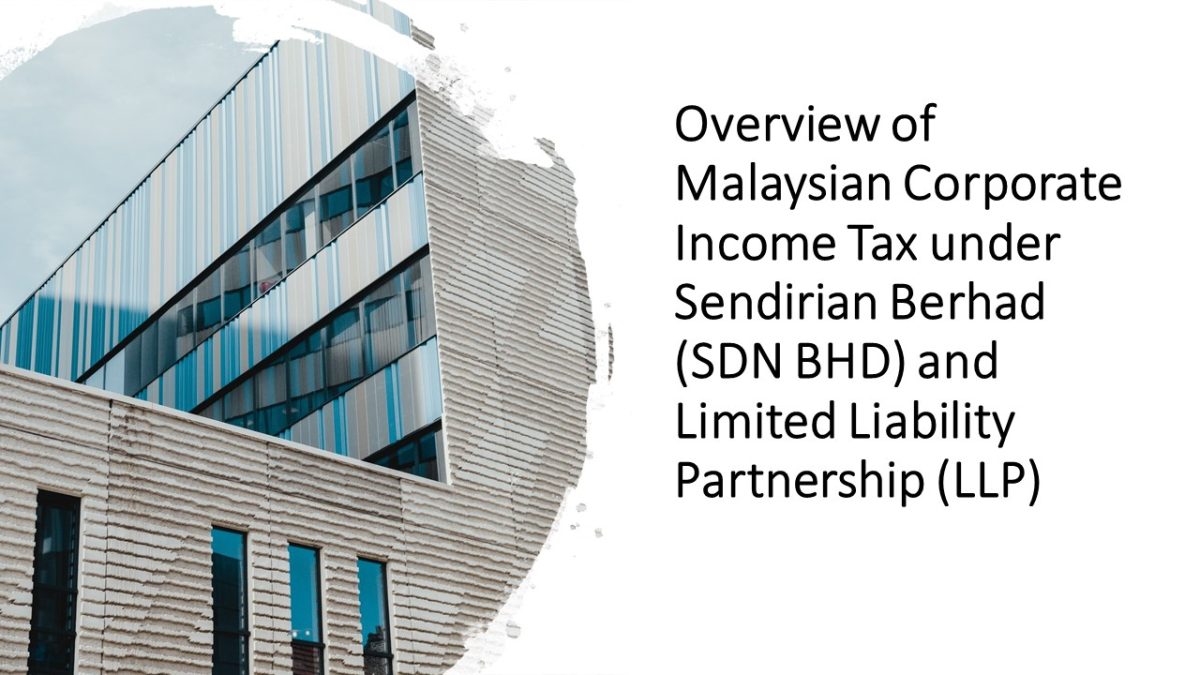Basis Period
With effect from the year of assessment 2014, the basis period of a company, Limited Liabilty Partnership (LLP), trust body and co-operative society will be determined based on the following criteria:-
- If the financial period is less than 12 months ending on a day in the same year, that period is the basis period for the first year of assessment (YA). For instance, if a company’s first accounting period starts from 1st February 2019 to 30th September 2019, this period of 8 months will be the first basis period. The year of assessment is 2019.
- If the financial period is ending on a day in the second year, that period is the basis period for the 2nd YA. For instance, if a company’s 1st accounting period starts from 1st October 2019 to 30th September 2020, total period of 12 months, the company’s 1st YA would be 2020.
- If the financial period of more than 12 months ending on a day in the third year, that period is the basis period for the third YA and there are no basis period for the first YA and 2nd YA. For instance, if a company’s first financial year starts from 1 November 2019 to 30 April 2021, total period of 18 months, 2021 would be the company’s first YA, over lapping 3 calendar years.
Taxability
A Company in Malaysia is subject to income tax at the rate of 24% based on law stated as at 2019. However, if you qualify as a small medium enterprise (SME), the first RM600,000 of chargeable income will subjected to a lower rate of 17%, with the remaining balance taxed at the rate of 24%.
The company will qualified as a SME if the company quality the following criteria:-
- First, the paid-up capital is less than RM2.5 million at the beginning of the basis period of a year of assessment;
- Second, the company in Malaysia is not control, or controlled directly or indirectly by a related company which has more than RM2.5 million in paid up capital; and
- Third, annual turnover less than RM50 million.
Apart from the preferential tax rate for the initial RM600,000, SME are exempted from providing a tax estimate for the first 2 years of assessment and there is no limit to the capital that SME can claim on small value assets.
Company Losses
A company may incur loss in the basis period for a year of assessment. S.44(2) of the income tax act provides that such loss may be deducted against any other income that the company generated during the same basis period. For instance, interest income, rental income and any other source of income.
Where the basis year loss exceeds the aggregate income that the company may have in the basis period, s.43(2) of the income tax act allows such losses to be carried forward to subsequent basis period, to offset against its future business income. However, this is limited to the amount of unabsorbed business losses.
With effect from Year of Assessment 2019, the unabsorbed business losses can only be carried forward for 7 years of assessment.
Unabsorbed business losses are allowed to be carried forward and set off against future income if the company can satisfy the Director General of Inland Revenue that more than 50% of the shareholders of the company on the last day of the basis period are the same as on the first day of the basis period which losses are to be utilised.
Dividend Distribution
In the year 2008, a new single tier tax system was introduced. In simple term, tax paid by a company would be the final tax and such dividend no longer be subjected to any additional taxes when it is declared to the shareholders.
Record Keeping
s.78 of the income tax act enables the tax authority to prescribe the form of records a taxpayer must keep in order to ascertain the income or expenditure of an operation.
s.82 demands every taxpayer to keep sufficient records to be ascertained. Records are defined to include books of accounts, invoices, receipts, vouchers and any other records as may be specified by Director General. Pursuant to public ruling 4/2000, 5/2000 and 6/2000, those records include cash book, sales ledger, purchase ledger and general ledger. Supporting documents such as invoices, bank statements, bank in slips, cheque butts, payment receipts and payroll records. A valuation of stock in trade should also be made at the end of the accounting period with proper documentation maintained.
In addition, s.82A requires person to maintain sufficient records so that chargeable income and tax payable can be ascertained.
Any private money used in business, personal drawings, non trade debtors or creditors, assets, bank accounts, overdrafts must be recorded. Documentations of the aforesaid nature must be retained.




